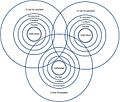Relevance facts for kids
Relevance is about how much one idea or piece of information is connected to or important for another. Think of it as how useful something is when you are trying to understand something else.
Scientists and thinkers study relevance in many areas. These include how our brains think (cognitive science), how we reason (logic), and how we find and use information (information science). It's also a big part of epistemology, which is the study of knowledge itself.
What Does Relevance Mean?
Imagine you have a goal, like solving a puzzle. Something is relevant if it helps you reach that goal. For example, knowing the shape of a puzzle piece is relevant to fitting it in the right spot.
In school, teachers use a plan to teach subjects in a certain order. This is because understanding new topics often needs you to know older ones first. The older topics are relevant to the new ones.
How We Know What's Relevant
Epistemology is the study of how we gain knowledge and what counts as true. Our views on knowledge greatly affect what we think is relevant.
For example, if you are trying to understand why a certain plant grows well, your approach matters. If you believe that only direct observation is important, you might focus on watching the plant grow. This is an empirical way of thinking. So, careful observations would be very relevant to you.
If you believe that the plant's environment is key, then studying the soil and sunlight would be relevant. Different ways of thinking lead to different ideas about what information is important.
Relevance in Society
During the 1960s, the word relevance became very popular. It often meant how important something was to big social problems. These problems included racial equality, poverty, social justice, and world hunger.
Some people felt that certain subjects, like studying old poems or business law, were not worthwhile. They thought these subjects did not help solve urgent social problems.
However, others disagreed. They argued that the world has many different concerns, not just social ones. They also pointed out that many real-world problems are complex. For example, big increases in crop production in the 20th century came from basic science discoveries, not just social movements. Both types of efforts can be relevant in different ways.
Images for kids


